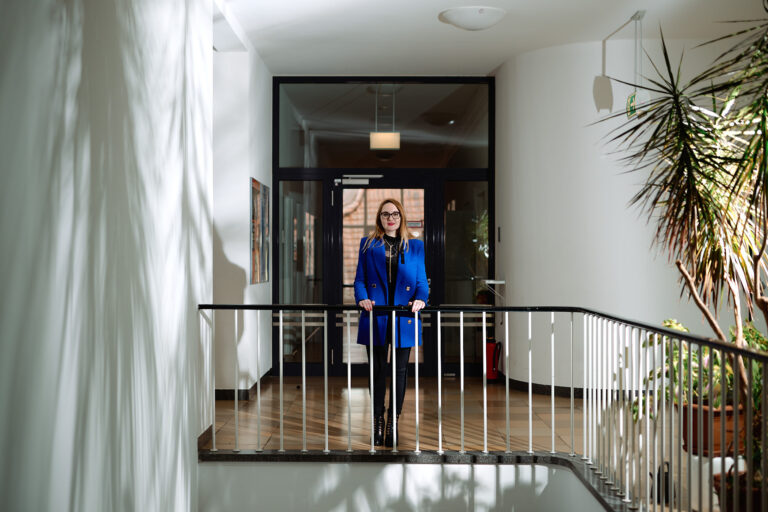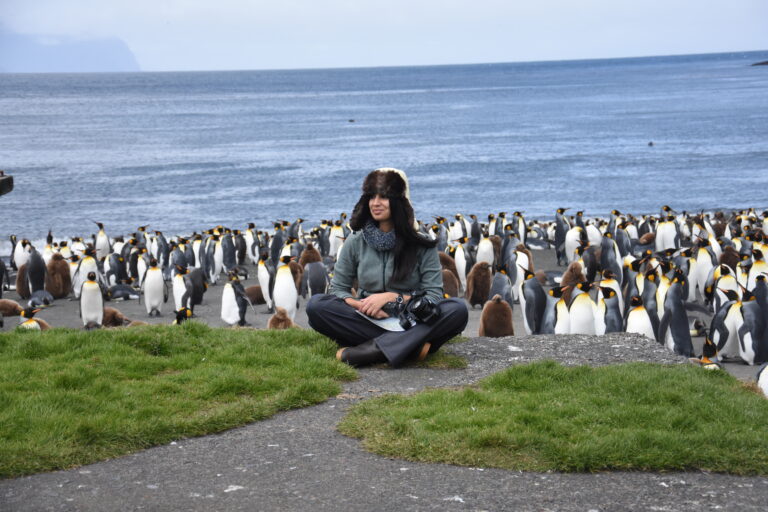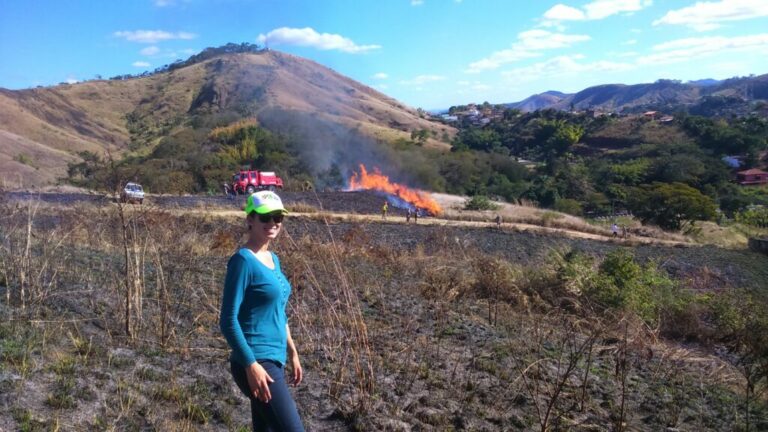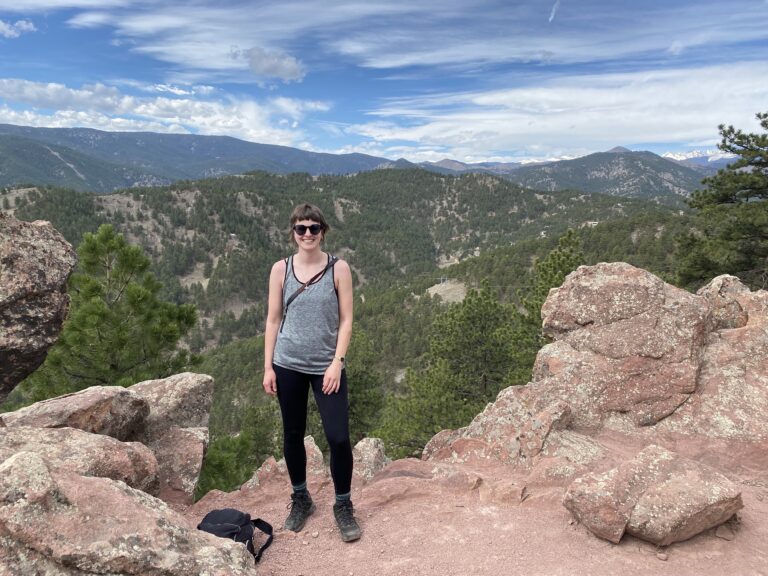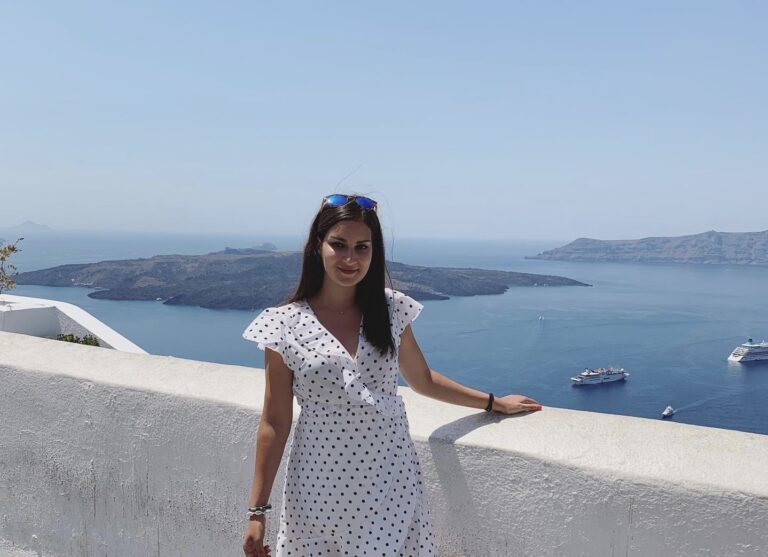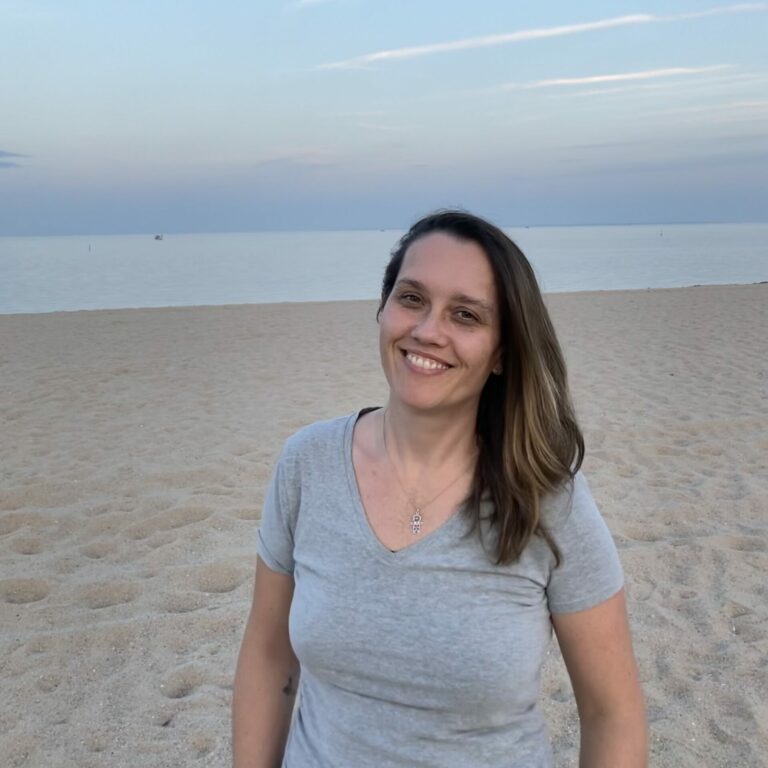
An Interview with Dr. Kornélia Baghi – How a Childhood Dream Turned into a Career as An Expert in Ovarian Cancer Research
In the series “33 questions” we introduce, in no particular order, our WiRe Fellows who are currently working on a research project here at the University of Münster. Why 33? Well, if we think of the rush hour of life, it is kind of the age that lies in its middle. And we also like the number😉.
In today’s episode we speak to Dr. Kornélia Baghy, molecular biologist and expert in the field of cancer research.

1. What motivated you to work in the field of molecular biology?
I went with the flow. I’ve always loved biology and had it as a core subject in high school. At the university we studied everything from plant physiology to ecology. I preferred molecular biology and was good at it. Cancer research combines the utilization of molecular biology with the pursuit of improving a global healthcare issue. It felt right to take that path.
2. Describe your daily work in three words.
Reading, analyzing, instructing.
3. Describe your research topic in three words.
Understand and fight cancer.
4. A good biologist needs …?
What researchers of any discipline need: An open mind with objective analysing ability and the talent of integrating and interpreting their findings.
“Research is to see what everybody has seen and think what nobody has thought”
– Albert Szent-Györgyi
5. What is the best experience you have had as a scientist / researcher?
When I read the following: “Dear Dr. Baghy, I am pleased to inform you that your manuscript ..(title)… has been accepted for publication in the journal of… (journal name)….”
6. What was your biggest research disaster?
Well, it wasn’t really a “big” disaster. I was a beginner back then. Once, I prepared a plate of PCR reactions (now everyone knows about PCR thanks to COVID-19) and ran it overnight. The next day, I checked the results and found there was no signal. Nothing at all. I spent almost an entire day trying to figure out what went wrong, checking every step without any success. Finally, I decided to repeat it all over, and opened the instrument to remove the plate. And… there was no plate! I forgot to put it in and left it in the centrifuge. I don’t know, if the relief or the anger was stronger when I realised what a rookie mistake I made.
7. Which (historical) important scientist would you like to have dinner with? What would you ask?
Rosalind Franklin. I guess the name is familiar to only a few. But if I say she worked together with James Watson and Francis Crick on DNA structure that clarifies the picture. She was a chemist and it is said that she played a significant role in the work, taking X-ray diffraction images and contributing greatly to resolving structural contradictions based on her chemical background. It is possible that she suggested changing the early three-helix model to a two-helix. Still, her name is not that famous. I would ask her to tell me her version of the story.
8. If time and money were no object: Which research project would you like to do?
During the years of research we did quite a lot of interesting and important observations that were not closely related to the main projects we had funding for. I think I would conduct all those abandoned investigations as I believe their results would greatly contribute to understand the role and actions of the tumor microenvironment.
9. What is your favorite research discipline other than your own?
Astronomy, but I do not know anything about it. Since I have been researching at the molecular level, I have become accustomed to seeing myself as a huge being. My mind works like that. It fascinates me how others can think and do research in a magnitude where we really are as big as one quadrillionth of a grain of dust (and I know I still overestimated our size). The funny thing is that both disciplines utilise magnifiers (microscope and telescope) for observation.
10. What do you consider the greatest achievement in the history of science / your field?
1. Discovery of DNA structure, 2. Sequencing the human genome (HUGO project), 3. Development of CRISPR/CAS9 system for genome editing (Nobel prize winner in 2020).
11. Which experience in the world of science disappointed you most?
Probably the publishing process. Researchers are under a huge publication pressure, if they want to be viewed as competent in their field. Collecting impact factors and citations are of the utmost importance if they want to get funded. So the system goes like this: a researcher must publish to obtain a PhD, must publish more to win grants and support research. So the publisher charges the authors (researchers) for sending the manuscript to the journal, AND charges the readership as well. In the meantime, for keeping the high scientific standard of the journals, the very same researchers scientifically review those manuscripts for FREE. The whole system is unfair.
12. What was the funniest moment you had in science?
I remember once I went to the vivarium where I needed to collect DNA samples from 2-3 week old mice. They are the cutest things ever… but extremely good at jumping! So when we opened their cage it was like a confetti of mice . It took some time to catch all of them in the room :D.
13. How did you survive your PhD time?
Easily. Those were some of my happiest years in life. The perfect balance of self-improvement (professionally and individually) and having fun. My lab became my second family.
14. What direct or indirect relevance does your research have for society?
Management of various types of cancer keeps improving year by year. In spite of that, the number of patients discovered with various tumours permanently increases. Ovarian cancer is among the global leading cause of tumour-associated deaths in women. Each year approximately 240,000 women are diagnosed with ovarian cancer across the world, reflecting on the high prevalence and associated fatality of the disease. The most commonly applied clinical intervention for ovarian cancer involves “mass debulking,” often combined with chemo- and radiotherapy. Thus, to understand the biology behind the association of ovarian cancer with low survival rate, poor prognosis and rapid tumour relapse is a major concern. We can say this is a contest between cancer and its prevention and treatment. The approach of cancer management still lacks the consideration of extracellular matrix (ECM) and stromal components of cancer known as factors actively participating in the development and progression of malignant tumours.
In our previous research projects we made attempts to fill this gap studying tumour-stroma interactions on various models. Our molecule of interest is named SPOCK1, a hardly known protein (proteoglycan) with high oncogenic potential. Our hypothesis is that its high level in ovarian cancer is associated with the aggressiveness of the disease. This implies that its detection in the blood circulation can be utilized as a diagnostic marker – as a final goal – in cancer, or in prediction of metastases. At the moment, the real nature of the protein is unknown, but on the basis of the previous results there is a significant probability, that it can be successfully utilised for the early detection of tumors, or the appearance of metastases. A further possibility could be to consider this protein as a therapeutic target.
15. How did you imagine the life of a scientist / researcher when you were a high school student?
I thought they were very bright people in white lab coats working at benches, mixing colorful solutions with pipettes, or looking into the microscopes. I imagined all of them trying to find cures for human diseases.
16. Is it actually different? In what way?
In part it is the same as I thought. But I had no clue about the rest, the background, like reading and writing all the time. Not to mention the importance of getting financial support for research.

17. What do you like most about the “lifestyle” of a scientist? And what least of it?
I like that it never gets boring. Always new tasks and new problems to solve. It keeps my mind free and busy at the same time. Also, the flexible working hours are definitely an advantage. The least I like is that it never ends. Sometimes, I envy those people who finish their day with the feeling “I’m done with my work”.
Research flows continuously, you can just take a halt, but never get it finished.
18. Do you think your career would have evolved differently if you were a man?
Definitely. I already lost a lab leader position (originally intended for me) because of having my son, and not being on the spot. But a detour in career or in life is not necessarily bad and may bring new possibilities, such as a WiRe fellowship.
19. If you were the research minister of Germany, what would you do to improve the situation of women in science?
I think the key to it is the improvement of the daycare and kindergarten system. If it is available, reliable and affordable that is the biggest help for researchers with family.
20. If you had a daughter, what would you advise her not to do?
Tough question as I have a son. Probably, I would advise her not to compare herself to anyone, especially not to men. We are different, meaning neither better nor worse. Embrace uniqueness and personal relationships and do not be deceived by the false pink balloon-like lives of others shown on social media. I would tell her to believe in herself no matter what and not to leave the right path that her heart designated. That is the key for happiness without regret.
21. What is the biggest challenge for you when it comes to balancing family and career?
The lack of time. I feel like I’m always behind with work in all aspects. My motto is: family first. Luckily, my husband takes a huge part in the housework (yes, it is possible to find a man like that).
22. How often do you as a friend / partner / mother / daughter feel guilty when you have to meet a deadline again?
I would say never. I do my best to accomplish everything without interfering with the quality time spent with my family. It means I often work at night. I keep telling everyone that when I’m done with this deadline, then I can have a little rest. This statement is usually followed by a big laugh from my husband saying…”Yeah, sure…”.
23. How did you imagine your future as a child? What profession did you want to pursue?
I’ve wanted to become a biologist since I was four. I was obsessed with nature, with watching TV programs about wildlife. David Attenborough was/is my favorite. I wanted to do the same, to observe animals and describe their behaviour around the world. I wrote a “book” about animals when I was five!
24. How do you keep your head clear when you are stressed?
I read. Not only when I’m stressed, but also every night before sleeping. I usually read something light that has nothing to do with the “real world”. Right now it’s Tolkien’s Lord of the Rings.
25. What is your favorite German word?
Prost!
26. What makes you most happy about the world?
Its perfection. From the atomic level to the entire planet. No matter if I watch a leaf, or the bends of a snail shell, or the figure of a duck, or the circulation of elements in the ecosystem. All is perfect.
27. What or who inspired you to become a molecular biologist?
The beauty of the nature inspired me to become a biologist. The molecular biology came later, and its complexity was captivating.
28. Which of your traits bothers you the most in your daily work?
I want an answer for every question. No matter what the question is. I must learn to prioritise more effectively to save time. Also, I think I express myself in a quite condensed way, and I often have to repeat what I intended to say with more explanations.
29. What worries you most about the world?
I feel that the developed countries are losing their common sense, and that frightens me. I hope I do not have to see the downfall of Europe, but cultural and social issues could overwhelm the countries, and the meaning of liberty could be turned upside down. Some things that are currently happening remind me of Orwell’s 1984, and that is really scary.
30. Which hobby have you given up for a life in academia?
I used to do horseback riding, but when I started university and moved to the capital, I had no time for that. However, I occasionally get a chance to do it in the last few years.
31. If you could travel in time: in which epoch and at which discovery or event would you have liked to have been there?
I would say the 17th century. So many basic discoveries happened in that time, like the discovery of the microscope, microbes. It is the time when Kepler and Galilei lived and had fundamental roles astronomy and physics. If I could time-travel, I would very much like to be at the event, when that particular apple fell on Isaac Newton’s head from the apple tree. First of all, I would know if the story is really true, second, I may get a chance to talk to him about his laws.
32. What are the advantages and disadvantages of doing a Research@home-WiRe-fellowship?
The advantage is that I can stay with my family, because I could not have taken all of them to Germany. The disadvantage is that I cannot meet the people there in person, only on screen. I cannot gain new experiences in another lab and in another country. But as my fellowship ends in August 2021, I might have a chance for a short visit, when the pandemic is over.
33. What is your favourite place to relax from research during Corona?
When the weather was nice we often took a trip to the Balaton Lake in Hungary. In our city, there are also a few fishing lakes around in a walking distance to clear up our minds and lungs. I like being around of natural waters.


